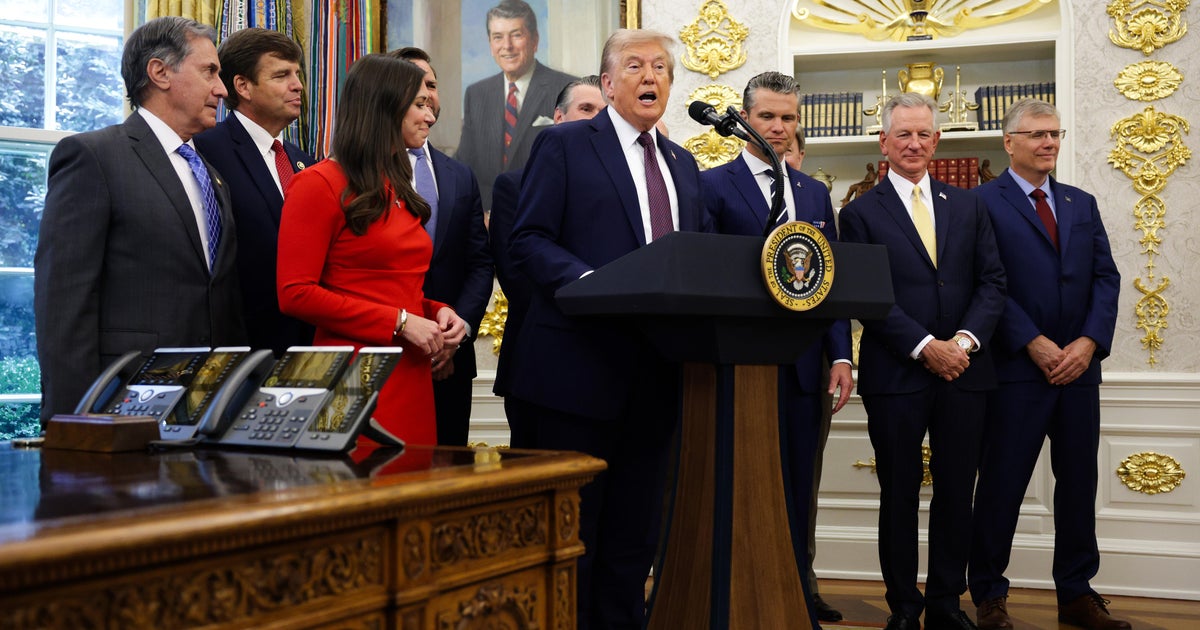Controversy Surrounding the Relocation of Space Command Headquarters

Introduction
President Trump has announced that the Space Command headquarters will be moving from Colorado to Alabama, according to sources. This move has been highly anticipated and has caused quite a stir among both political and military communities. The decision comes after months of deliberation and has sparked debates about the reasoning behind the relocation.
Key Details
The Space Command headquarters, currently located in Colorado Springs, is responsible for overseeing and managing military operations in space. The move to Alabama has been met with mixed reactions, with some praising the decision while others question the potential impact on national security. Some speculate that the move may be politically motivated, as Alabama is a key state in the upcoming presidential election.
Impact
This relocation is not just a simple change of address, but will have significant implications for the military and for the state of Colorado. It is estimated that the move will bring over 1,400 jobs to Alabama and will also have a major economic impact on the state. On the other hand, Colorado will lose a major military presence and a significant source of revenue. Only time will tell how this decision will truly affect both states and the country as a whole.
About the People Mentioned
President Trump
Donald John Trump, born June 14, 1946, in Queens, New York, is an American businessman, media personality, and politician who has served as the 45th and 47th president of the United States. He graduated from the University of Pennsylvania's Wharton School with a degree in economics in 1968 and took over his family’s real estate business in 1971, renaming it the Trump Organization. Over decades, he expanded the company’s holdings into skyscrapers, hotels, casinos, and golf courses, building a high-profile brand often associated with luxury and real estate development. Trump also gained fame as the host of the reality TV show *The Apprentice* from 2004 to 2015[1][3][7]. Trump entered politics as a Republican and won the presidency in 2016, defeating Democrat Hillary Clinton in an unexpected victory. His tenure from 2017 to 2021 was marked by significant policy shifts, including tightening immigration controls, imposing a travel ban on several Muslim-majority countries, expanding the U.S.–Mexico border wall, rolling back environmental regulations, implementing major tax cuts, and appointing three Supreme Court justices. His foreign policy included withdrawing the U.S. from international agreements on climate change and Iran’s nuclear program, and initiating a trade war with China. Trump's handling of the COVID-19 pandemic was widely criticized for downplaying the virus's severity. After losing the 2020 election to Joe Biden, he challenged the results, culminating in the January 6, 2021, Capitol attack. Trump was impeached twice but acquitted both times by the Senate[1][2]. In a historic political comeback, Trump was re-elected and inaugurated for a second non-consecutive term on January 20, 2025, becoming the oldest president to assume office at age 78. He remains a highly influential and polarizing figure in American politics[2][7]. Trump is married to Melania Trump, with whom he has one son, Barron, and has four adult children from previous marriages. He has authored several books, including *The Art of the Deal*, a business bestseller[3][5][7].
About the Organizations Mentioned
Space Command
**United States Space Command (USSPACECOM or SPACECOM)** is a unified combatant command under the U.S. Department of Defense responsible for military operations in outer space, specifically at altitudes 100 kilometers and above[1][6]. Established initially in September 1985, its primary mission was to provide joint command and control over all U.S. military forces operating in space and to coordinate with other combatant commands[1]. It was disbanded in 2002, with its duties absorbed by United States Strategic Command, but was reactivated in August 2019 due to the increasing importance of space as a contested warfighting domain[1]. SPACECOM’s core mission is to plan, execute, and integrate military spacepower into multi-domain global operations to deter aggression, defend U.S. national interests, and defeat threats when necessary[1][8]. This involves critical capabilities such as space operations, sensor management, satellite communications, and trans-regional missile defense[6]. It works closely with allies and partners worldwide, emphasizing cooperation in space security and defense. The command operates under four foundational "space truths" emphasizing the vital importance of space to national security, the necessity of space superiority, the role of space warfighters, and the strategic advantage provided by space’s high ground[1]. The U.S. Space Force, a separate military branch established in 2019, organizes, trains, and equips most of the forces that USSPACECOM employs, although personnel from other service branches also contribute[1][5]. SPACECOM is headquartered in Colorado Springs, Colorado, where it coordinates joint forces across services. Its reestablishment reflects the U.S. government’s strategic recognition of space as a critical domain for future conflicts and technological competition[3][5]. The command’s evolution underscores the growing intersection of defense, technology, and space business sectors, highlighting its role in advancing space-based capabilities and integrating space operations into global military
Alabama
The term "Alabama" typically refers to the U.S. state located in the southeastern region, rather than an organization. However, I can provide a summary of the state's government and notable aspects that might be of interest to readers in business and technology: ## Overview of Alabama Alabama is a state governed by a bicameral legislature, consisting of the Senate and the House of Representatives, alongside a governor and cabinet. The state government plays a crucial role in managing various sectors, including education, healthcare, and economic development. ## History Alabama's government structure has evolved since its inception as a territory in 1817. It became a state in 1819 and has since adopted several constitutions, with the current one being the 1901 Constitution. Over the years, the state has implemented significant reforms, such as the merit system in 1939, which aimed to improve administrative efficiency by consolidating functions and establishing a more organized civil service[2]. ## Key Achievements and Current Status Alabama has been focusing on economic development, particularly in the automotive and aerospace sectors. The state is home to major companies like Mercedes-Benz and NASA's Marshall Space Flight Center. In healthcare, Alabama has a comprehensive public health system with departments like the Alabama Department of Public Health, which oversees various health initiatives and emergency preparedness[4]. ## Notable Aspects - **Economic Growth**: Alabama is known for its strong manufacturing sector and has been successful in attracting foreign investment. - **Technological Advancements**: The state is involved in advanced technological research, particularly in aerospace. - **Education and Healthcare**: Alabama invests significantly in education and public health, with a focus on improving outcomes in these areas. In summary, Alabama is a state with a rich history, diverse economy, and ongoing efforts to enhance its technological and business sectors. While it is not an organization in the traditional sense, understanding its government and economic landscape can provide valuable insights for those interested in business and technology news.
Colorado
## Overview Colorado, as referenced in your query, is not a single organization but a U.S. state with a dynamic government, robust economy, and a strong focus on innovation, particularly in business and technology sectors. Its governance structure is divided into legislative, executive, and judicial branches, each with specialized offices and agencies that oversee everything from transportation and healthcare to business regulation and higher education[1]. Colorado’s state government actively shapes policy in areas critical to business and technology, including economic development, workforce training, and information security[1]. ## History and Evolution Colorado became the 38th U.S. state in 1876, and its economy has evolved from mining and agriculture to a diverse mix of technology, aerospace, renewable energy, and advanced manufacturing. The state’s higher education system, led by institutions like Colorado State University (CSU), has been a key driver of research and workforce development, with CSU alone boasting over 34,000 students and nearly $500 million in annual research expenditures[4]. The state’s government has a long history of supporting entrepreneurship, evidenced by its business-friendly regulatory environment and a steady increase in new business entity filings year over year[5]. ## Key Achievements Colorado has distinguished itself as a leader in renewable energy, public transit innovation, and healthcare policy. Governor Jared Polis’s administration has prioritized partnerships with regional transit authorities to improve governance, budget transparency, and ridership, aiming to create an “A+ transit agency” for the Denver metropolitan area and beyond[2]. The state is also proactive in healthcare reform, hosting major policy conferences that bring together industry leaders to address challenges like the opioid epidemic and healthcare equity[3]. In the business realm, Colorado has streamlined processes for business registration and is updating requirements for registered agents to further ease doing business[9]. ## Current Status and Notable Aspects Today, Colorado is recognized for its thriving tech sector, often referred to as the “Silicon Mountain,” with a concentration














